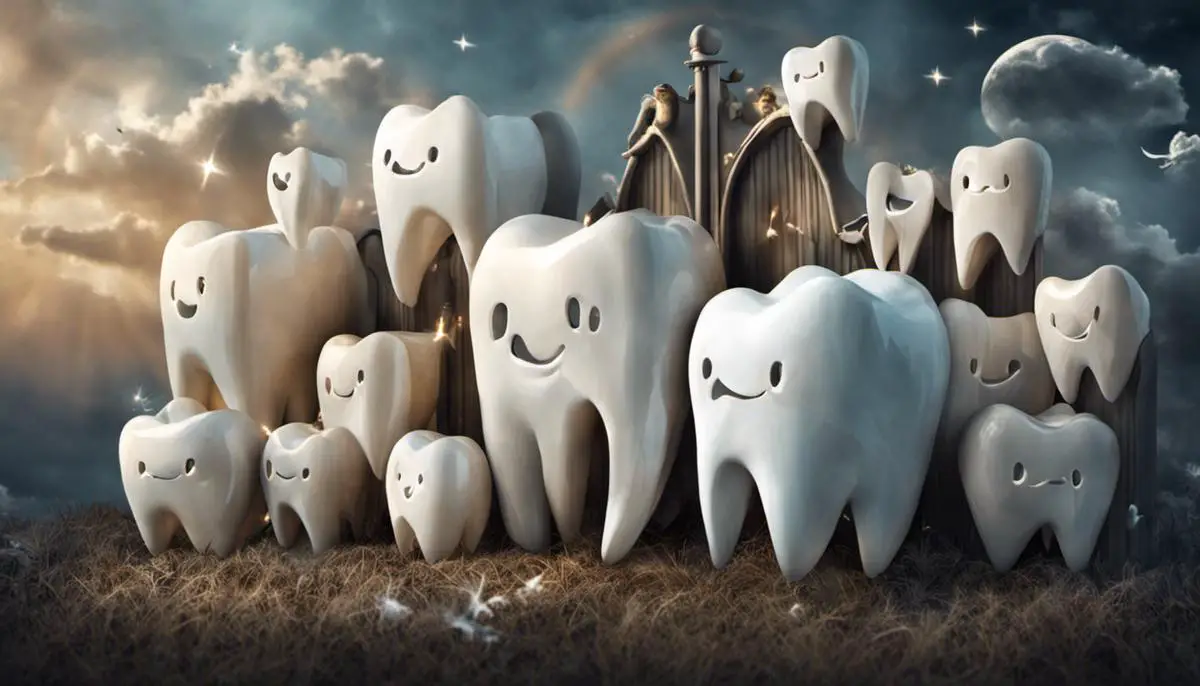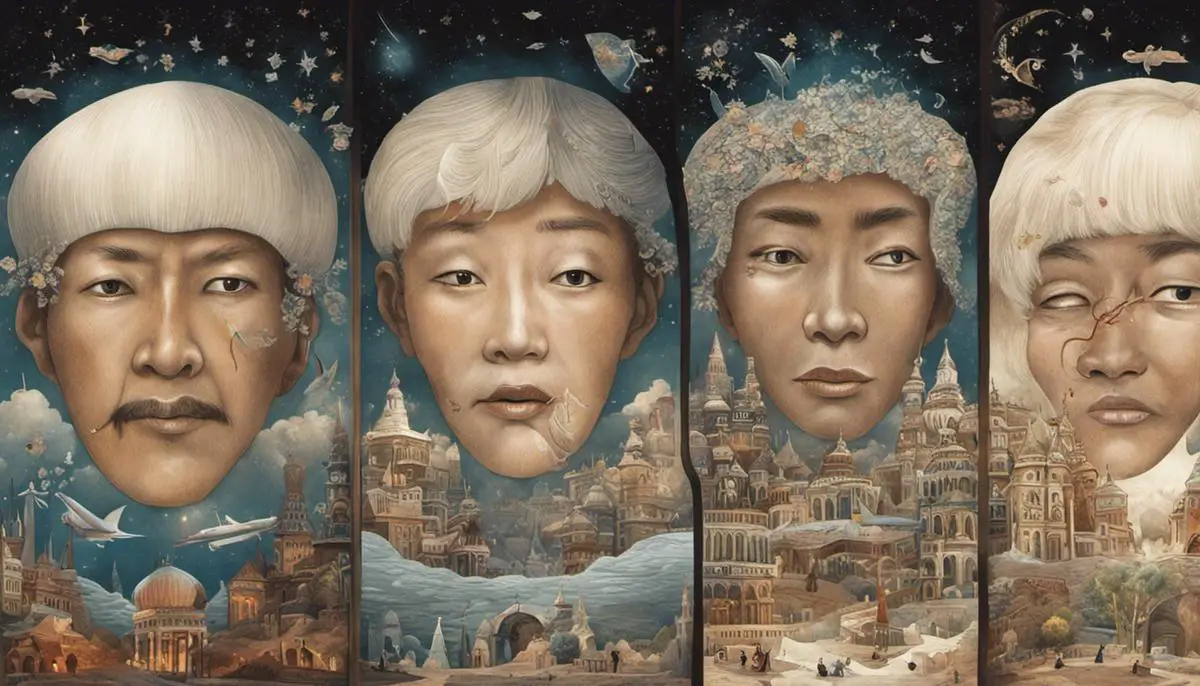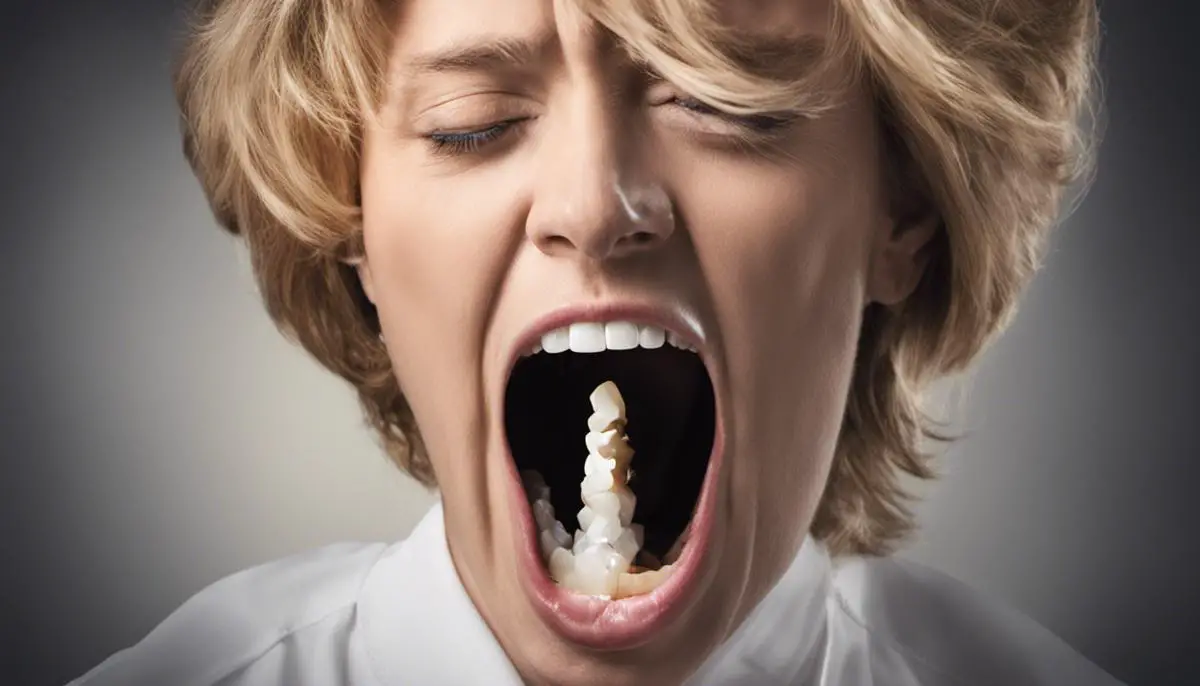The realm of dreams has long been a source of mystery and intrigue, with numerous interpretations spanning various psychological, cultural, and health paradigms. A recurring theme often explored in this milieu is the dream of tooth loss, a symbolic event that derives its meaning from a multitude of perspectives. This investigation delves into the symbolic representation of teeth in dream interpretation, focusing on the psychological implications anchored upon theories by prominent psychologists. It further explores the cultural interpretations of these dreams, inviting us into the fascinating labyrinth of diverse beliefs and superstitions that revolve around tooth loss across different cultures. From a psychoanalytic perspective, the analysis delves deeper into the subconscious realms, examining how psychological conflicts and repressed emotions might surface as dreams of tooth loss. Finally, it probes beyond the subconscious, into the physiological realm, exploring the potential physical health implications of these dreams, based on available scientific research and evidence.
Psychological Symbols in Dreams
Unearthing Psychological Perspectives: An Exploration of Teeth Symbols in Dreams
The field of dream interpretation, a fascinating enclave within the vast realm of psychology, has long been an avenue of rigorous exploration and scholarly debate. Pioneers like Sigmund Freud and Carl Jung laid seminal groundwork, framing dreams as gateways to knowing the unconscious. A kernel of this intricate terrain of dream symbolism that this article delves into is the appearance of teeth or dental scenarios.
Manifestation of Teeth Dreams
Teeth dreams, as established by extensive surveys and psychoanalysis, rank among the most common. They elicit a varied range of emotions, from dread and anxiety to relief and surprise. These dreams feature a plethora of situations such as losing teeth, crumbling or rotten teeth, or having extremely sharp or oversized teeth. But the salient question remains: what do these symbols mean? What psychological underpinnings do they represent?
Freudian and Jungian Viewpoints
To Freud, the father of psychoanalysis, dreams of teeth typically symbolized a sexual connotation, in line with his theory of psychosexual development. However, Carl Jung held a divergent view. Jung surmised that teeth dreams, especially losing them, were representative of transitions, particular to growing older or experiencing a significant life change. The variance in interpretations elucidates the impressive depth and fluidity of dream symbology, further necessitating comprehensive exploration.
Anthropological and Cultural Interpretations
Not solely limited to psychoanalysts, anthropologists have also contributed their insights regarding teeth dreams. Many cultures perceive dreams of losing teeth as omens of impending death or misfortune. Yet, in some ethnic groups, it’s interpreted as assuredly positive, signaling forthcoming financial windfall or personal growth.
Psychoanalytic Perspectives on Teeth Dreams
Adopting a contemporary psychoanalytic lens, teeth symbols are interpreted as indicative of anxiety and loss of control. Given that teeth play a critical role in communication and nourishment, dreams featuring teeth symbolize essential life functions. Thus, those who experience such dreams could be grappling with communication issues or a fear of becoming powerless.
A dream of losing teeth, as several clinical investigations have outlined, is often linked to feelings of insecurity, incompetence, or impotence in one’s waking life. On the other end of the spectrum, dreams where teeth become bigger or sharper might signify growing confidence or the attainment of aggression necessary to tackle life’s challenges.
Moreover, molting teeth are not only a universal symbol of growth and transition but are also a marker of stress and life anxieties. Those struggling under the weight of a significant decision or change may find themselves dreaming of their teeth falling out.
Cracked or decaying teeth in dreams could be emblematic of fear or regret. This might reflect concerns over making the wrong choices or anxieties about physical appearance and health.
Addressing the complexity and profundity of dream symbols, like teeth, require a grasp of psychodynamics and an appreciation of cultural anthropology. No interpretation is absolute, as dreams are notoriously ambiguous, intricately tied to the dreamer’s life and subjective experiences. In the ceaseless pursuit of understanding the human psyche, the decipherment of these eerie dream narratives promises intriguing revelations, serving as another testament to the fascinating nature of psychological research.

Cultural Interpretations of Tooth Loss in Dreams
While one may not immediately consider the implications of cultural variance in the interpretation of dreams, these untangible, nocturnal narratives are largely shaped by our societies and upbringing. Given this, it’s hardly surprising that the interpretation of certain dream symbols, such as tooth loss, can widely vary across cultural divides.
Cultural perspectives on teeth dreams depart dramatically from the classical psychoanalytic perspectives. Where Carl Jung and Sigmund Freud might link tooth loss dreams with anxiety, repressed desires, or traumatic experiences, traditional societies around the world associate such dreams with myriad meanings, most of which are deeply ingrained in the particulars of local customs, beliefs, and oral traditions.
Cultural variances become evident in studies of dream interpretation across different societies. For instance, within many African societies, dreams of losing teeth are seen as bad omens, usually connected to the prospect of an impending death amongst family or friends. Owing to this, these societies tend to harbor significant fear towards these particular dream manifestations.
In stark contrast, Chinese interpretations often see dreams of tooth loss as a positive sign. Rather than morbid, the Chinese character for ‘lose’ is phonetically similar to the character for ‘leave’. Thus, in this culture, tooth loss in dreams may symbolize the individual’s transition from the old to the new or the elimination of unwanted habits.
In Hispanic societies, tooth loss is seen as a sign of change — specifically unexpected, dramatic shifts in relationships, family, or personal circumstances. The significance of these dreams often lies in the emotions they elicit, such as anxiety or anticipation, reflective of the individual’s perspective on change.
Offering an academic slant to the cultural approach, anthropologists assert that the human psyche is not a standalone entity, but rather one intricately woven into its social and cultural context. In this system of beliefs, tooth loss dreams are not merely an expression of the unconscious, but a manifestation of a collective unconscious influenced by ethnicity, culture, society, and personal experiences.
Empirical research in cultural psychology and anthropology supports this perspective, finding considerable differences in dream interpretation based on cultural affiliations. It suggests that our dream symbols, including tooth loss, are influenced by collective cultural experiences and values.
The influence of cultural background on the interpretation of tooth loss in dreams exemplifies the interconnectedness of biology and culture. The meaning of losing a tooth in a dream, much like every other symbol and experience recognized within the dream world, is multifaceted. It is most accurately considered through diverse lenses — psychological, sociocultural, and personal — highlighting the essentially human trait of dreaming and all its unique interpretations.
In conclusion, it is irrefutable that a person’s cultural background significantly influences the interpretation of their dreams. An understanding of such a correlation grants us an enriched perspective of the human mind, notably the clout of cultural dynamism in shaping subconscious narratives. Thereby, it engenders a broader cross-cultural comprehension of human psychology.

Psychoanalytic Perspective on Tooth Loss Dreams
Exploring deeper into the psychoanalytic theory, tooth loss dreams possess a multi-layered interpretation related to deeper subconscious feelings. Rooted in Freudian conceptualization, the loss of teeth in dreams may symbolize a sense of powerlessness or concerns about self-image, acting as an emotionally symbolic channel to express repressed sentiments.
Emphasizing the branch of psychoanalytic theory, the context of a dream significantly affects its interpretation. Tooth loss often connects with apprehensions about age, appearance, or attractiveness, symbolizing anxiety about one’s significant life transitions or fear of becoming less enthusiastic or vigorous.
This psychoanalytic interpretation aligns with theories of subconscious reflection. The brain, in its sleep state, processes these concerns into symbolic dream events. These interpretations, however, are not strict dictations; they are intricate delineations influenced by individual psychological experiences.
One intriguing psychoanalytic perspective posits that dreams about tooth loss could be an echo of a primitive anxiety – the fear of castration, hailing from Freud’s psychosexual stages theory. It’s proposed that such dreams could be a latent flashback to a time when losing teeth was the child’s first substantial experience with body dismemberment.
Furthermore, these dreams can also be seen as a manifestation of the famous Freudian “death drive.” According to Freud, this is a subconscious urge toward self-destruction, which can manifest symbolically through dreams of losing teeth. While having numerous critics, this interesting theory, when applied to tooth loss dreams, may provide profound insights about the psyche’s deeper realms.
Advancing the conversation further, the dynamic between teeth and oral activity—such as speaking and eating—can mean tooth loss dreams may also signify difficulties in communication or assimilation of life experiences. Teeth play an essential role in both activities; their loss may symbolize the dreamer’s inability to process, communicate, or “chew over” certain life situations harmoniously.
It’s crucial to note, however, that the interpretation of tooth loss dreams, as with any dream symbol, is not uniform. Personal meanings of symbols can significantly differ due to variables such as cultural backgrounds, individual experiences, and emotions associated with the dream symbol.
In the larger psychoanalytic context, exploring tooth loss dreams certainly contributes to a broader understanding of human subconscious experiences. Furthermore, it fosters interdisciplinary dialogue between psychoanalysis and other fields like anthropology, while enhancing the holistic understanding of the human mind—the ultimate vanguard in psychoanalytic pursuits.
In totality, the exploration of tooth loss dreams through psychoanalytic theory elucidates the complexity of our subconscious mind. The actual dream experience—a baffling and intimate encounter—reveals much about our hidden fears, desires, and experiences while aiding to understand the remarkable and mysterious terrain of the human psyche.

Health Implications of Tooth Loss Dreams
Shifting the attention from previously discussed psychoanalytics and cultural implications, direct focus must be cast on the subject of potential health implications linked to dreams of losing teeth. Analyses within the medical field have indicated intriguing correlations indeed, but it must be stressed that these are not explicitly causative. Dreams remain a scientific enigma to some extent, and while numerous theories exist, no definitive answers can be provided. Yet it is undeniable that this aberrant theme prevailing in dream narratives across the globe prompts exploration into potential medical interpretation and health implications.
Anecdotal evidence, primarily sourced from studies on sleep-related disorders, have noted an interrelation between individuals worrying about teeth and subsequent manifestations of such anxieties in their sleep-induced hallucinations. Aspects such as temporomandibular disorders or bruxism, the latter being a chronic condition where sufferers habitually grind their teeth during sleep, have shown an inextricable link to dreams of losing teeth. This particular correlation might suggest that dreams of losing teeth could potentially be a subconscious response to physical sensations experienced while sleeping.
An argument can be made for the potential correlation between dental dreams and a broader range of health issues beyond merely dental afflictions. Several studies suggest that dreams about dental harm may hold an empirical relationship with deficiencies in vitamins or minerals. Such systemic issues are believed by some to trigger recurrent dreams featuring tooth loss or degradation, though verification of this theory requires further investigation.
Sleep apnea, a prominent and often fatal sleep disorder categorized by momentary lapses in breathing while asleep, has also been cursorily linked to dreams of lost teeth. Patients afflicted with this disorder have reported repeated dreams of teeth falling out, being pulled, or otherwise lost. However, due to the intimate connection between breathing and the oral cavity, one must also consider the option that this too might be the brain’s way of processing physical sensations experienced during slumber rather than an indicative symptom of the disorder itself.
it is imperative to underline that despite these observed correlations, deducing a direct health implication without encompassing medical check up from dreams of losing teeth would be misguided. Notwithstanding, it offers an advantageous course of action for medical professionals and dream researchers to initiate dialogue, combining their varied expertise in an effort to demystify the enigma of dreams.
Furthermore, it is crucial to consider the impact of individual perception and personal experiences in this complex equation. Just as cultural background influences dream interpretation, so too do personal health experiences and psychological traits. Undeniably, dreams are a multifaceted narrative combining interwoven threads of physical, psychological, and cultural elements to form a personalized subconscious tale.
Rooted in the combined domains of psychoanalysis, culture, and medical health, the exploration of tooth loss dreams presents a labyrinth of intricacies that require meticulous decoding. Despite the many strides taken in dream research, the discourse surrounding health implications of such dreams is still fluid, with existing theories merely scratching the surface of this profound psychological phenomenon. The pursuit of this subject serves not only to understand the enigma that is dreams, but also to comprehend the intricate labyrinth that is the human psyche.

Turning the final page, we uncover how a single subject concerning dreams can carry such profound weight and diverse interpretations. Whether viewed from the lens of psychological symbolism, analyzed through cultural belief systems, filtered within the framework of psychoanalytical theory, or correlated with potential physical health implications, dreams of tooth loss open up vast paths for exploration and understanding. It is a compelling reminder of how interconnected our mental processes are with our emotional, cultural, and physical realities. Unlike opaque mysteries never to be solved, the phenomenon of teeth loss dreams are nuanced narratives that tell a compelling story, encouraging an ongoing journey of personal and collective understanding.
